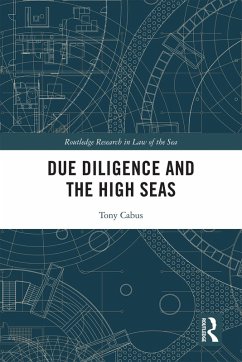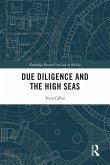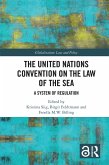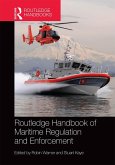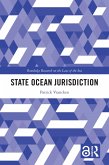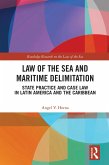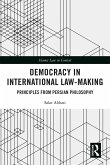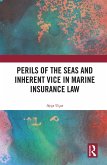Tony Cabus
Due Diligence and the High Seas (eBook, PDF)
43,95 €
43,95 €
inkl. MwSt.
Sofort per Download lieferbar

22 °P sammeln
43,95 €
Als Download kaufen

43,95 €
inkl. MwSt.
Sofort per Download lieferbar

22 °P sammeln
Jetzt verschenken
Alle Infos zum eBook verschenken
43,95 €
inkl. MwSt.
Sofort per Download lieferbar
Alle Infos zum eBook verschenken

22 °P sammeln
Tony Cabus
Due Diligence and the High Seas (eBook, PDF)
- Format: PDF
- Merkliste
- Auf die Merkliste
- Bewerten Bewerten
- Teilen
- Produkt teilen
- Produkterinnerung
- Produkterinnerung

Bitte loggen Sie sich zunächst in Ihr Kundenkonto ein oder registrieren Sie sich bei
bücher.de, um das eBook-Abo tolino select nutzen zu können.
Hier können Sie sich einloggen
Hier können Sie sich einloggen
Sie sind bereits eingeloggt. Klicken Sie auf 2. tolino select Abo, um fortzufahren.

Bitte loggen Sie sich zunächst in Ihr Kundenkonto ein oder registrieren Sie sich bei bücher.de, um das eBook-Abo tolino select nutzen zu können.
This book firstly explores thoroughly the concept of due diligence, its purpose and its mechanisms in order to propose a comprehensive theory of due diligence in harmony with the general law of State responsibility. In the meantime, this book also explores the usefulness of due diligence to address modern challenges afflicting the high seas.
- Geräte: PC
- mit Kopierschutz
- eBook Hilfe
Andere Kunden interessierten sich auch für
![Due Diligence and the High Seas (eBook, ePUB) Due Diligence and the High Seas (eBook, ePUB)]() Tony CabusDue Diligence and the High Seas (eBook, ePUB)43,95 €
Tony CabusDue Diligence and the High Seas (eBook, ePUB)43,95 €![The United Nations Convention on the Law of the Sea (eBook, PDF) The United Nations Convention on the Law of the Sea (eBook, PDF)]() The United Nations Convention on the Law of the Sea (eBook, PDF)41,95 €
The United Nations Convention on the Law of the Sea (eBook, PDF)41,95 €![Routledge Handbook of Maritime Regulation and Enforcement (eBook, PDF) Routledge Handbook of Maritime Regulation and Enforcement (eBook, PDF)]() Routledge Handbook of Maritime Regulation and Enforcement (eBook, PDF)51,95 €
Routledge Handbook of Maritime Regulation and Enforcement (eBook, PDF)51,95 €![State Ocean Jurisdiction (eBook, PDF) State Ocean Jurisdiction (eBook, PDF)]() Patrick VranckenState Ocean Jurisdiction (eBook, PDF)0,00 €
Patrick VranckenState Ocean Jurisdiction (eBook, PDF)0,00 €![Law of the Sea and Maritime Delimitation (eBook, PDF) Law of the Sea and Maritime Delimitation (eBook, PDF)]() Angel HornaLaw of the Sea and Maritime Delimitation (eBook, PDF)41,95 €
Angel HornaLaw of the Sea and Maritime Delimitation (eBook, PDF)41,95 €![Democracy in International Law-Making (eBook, PDF) Democracy in International Law-Making (eBook, PDF)]() Salar AbbasiDemocracy in International Law-Making (eBook, PDF)43,95 €
Salar AbbasiDemocracy in International Law-Making (eBook, PDF)43,95 €![Perils of the Seas and Inherent Vice in Marine Insurance Law (eBook, PDF) Perils of the Seas and Inherent Vice in Marine Insurance Law (eBook, PDF)]() Ayça UçarPerils of the Seas and Inherent Vice in Marine Insurance Law (eBook, PDF)41,95 €
Ayça UçarPerils of the Seas and Inherent Vice in Marine Insurance Law (eBook, PDF)41,95 €-
-
-
This book firstly explores thoroughly the concept of due diligence, its purpose and its mechanisms in order to propose a comprehensive theory of due diligence in harmony with the general law of State responsibility. In the meantime, this book also explores the usefulness of due diligence to address modern challenges afflicting the high seas.
Dieser Download kann aus rechtlichen Gründen nur mit Rechnungsadresse in A, B, BG, CY, CZ, D, DK, EW, E, FIN, F, GR, HR, H, IRL, I, LT, L, LR, M, NL, PL, P, R, S, SLO, SK ausgeliefert werden.
Produktdetails
- Produktdetails
- Verlag: Taylor & Francis eBooks
- Seitenzahl: 176
- Erscheinungstermin: 21. Dezember 2021
- Englisch
- ISBN-13: 9781000531831
- Artikelnr.: 62802844
- Verlag: Taylor & Francis eBooks
- Seitenzahl: 176
- Erscheinungstermin: 21. Dezember 2021
- Englisch
- ISBN-13: 9781000531831
- Artikelnr.: 62802844
- Herstellerkennzeichnung Die Herstellerinformationen sind derzeit nicht verfügbar.
Tony Cabus is a Post-Doctoral researcher at the Graduate School of International Cooperation Studies (GSICS) in Kobe University, Japan. His research focuses on the law of State responsibility and the law of the sea with the aim of providing solutions for a better protection of our oceans. He has obtained a PhD in international law from GSICS in Kobe University (2017-2020), a master degree in international and European law from both Grenoble-Alpes University (2014-2015) and Aix-Marseille University (2011-2012) in France, and, a Bachelor degree from the University of Picardy in Amiens. He was also a participant in the 2019 Summer Academy of the International Foundation for the Law of the Sea in Hamburg; and, an assistant in the 2017 edition of the International Symposium on the Arctic in Kobe. He was a beneficiary of the MEXT Scholarship from the Japanese Ministry of Education, Culture, Sports, Science and Technology and an awardee of the Ryoso Award from the Ryosokai association.
Introduction
1. A Rediscovered Concept
2. A "Constitution for the Ocean in Search of Content
3. Due Diligence: A Bridge Between Instruments and Actors
4. Outline of the Thesis
Chapter I: The Development of the General Theory of Due Diligence
Introduction
Section 1: The Early Development and Evolution of the Concept of Due
Diligence: From Early Theories to the ILC Codification
1. The Theoretical Roots of Due Diligence: The State's Responsibility
for Acts of Private Actors
2. The Early Judicial Practice on Due Diligence
3. Conclusion
Section 2: The Work of the International Law Commission
1. The Work of the ILC on State Responsibility
2. The Work of the ILC on State Liability
3. Conclusion
Chapter II: The Contemporary Conception of Due Diligence: Clarifications
and Constitutive Elements
Introduction
Section 1: The No-Harm Rule Confusion
1. The Tale of the Trail Smelter Arbitration
2. The Corfu Channel Overinterpretation
3. Conclusion
Section 2: Due Diligence: A Label of International Obligations
1. Due Diligence: The General Aspects
2. Due Diligence: Specificities of Environmental Law
3. Conclusion
Section 3: The Definition of Due Diligence and its Potential for the High
Seas
1. Working Definition of Due Diligence
2. The Utility of Due Diligence on the High Seas
3. Conclusion
Chapter III: The Viability of Due Diligence on the High Seas
Introduction
Section 1: Legal Basis of Due Diligence Obligations on the High Seas
1. The UNCLOS: A Primordial Framework
2. The Compliance Agreement: Reinforcement of Effective Control
3. The FSA: A Primary Tool for International Cooperation
4. The Guidelines on Deep-Sea Fisheries
5. The FAO Code of Conduct for Responsible Fisheries and the IPOA-IUU
6. The Voluntary Guidelines for Flag State Performance: Filling the
"Inability" Gap
7. Conclusion: The Internal and External Interplay of the UNCLOS
Section 2: Due Diligence Obligations and Control on the High Seas
1. Due Diligence and State-Owned Vessels
2. Due Diligence and Private Vessels
3. Conclusions on the Role of the Genuine Link
Chapter IV: Defining Due Diligence: From Interpretation to Law-Making
Introduction
Section 1: Due Diligence as an Informing Process
1. From Interpretation to Law-Making
2. The Critical Role of the Judge in the Determination of Diligence
3. Conclusion
Section 2: Shaping the UNCLOS for Modern Challenges
1. Informing the UNCLOS Through Due Diligence
2. Gaps and Limits of Due Diligence
3. Conclusion
Conclusion
1. A Rediscovered Concept
2. A "Constitution for the Ocean in Search of Content
3. Due Diligence: A Bridge Between Instruments and Actors
4. Outline of the Thesis
Chapter I: The Development of the General Theory of Due Diligence
Introduction
Section 1: The Early Development and Evolution of the Concept of Due
Diligence: From Early Theories to the ILC Codification
1. The Theoretical Roots of Due Diligence: The State's Responsibility
for Acts of Private Actors
2. The Early Judicial Practice on Due Diligence
3. Conclusion
Section 2: The Work of the International Law Commission
1. The Work of the ILC on State Responsibility
2. The Work of the ILC on State Liability
3. Conclusion
Chapter II: The Contemporary Conception of Due Diligence: Clarifications
and Constitutive Elements
Introduction
Section 1: The No-Harm Rule Confusion
1. The Tale of the Trail Smelter Arbitration
2. The Corfu Channel Overinterpretation
3. Conclusion
Section 2: Due Diligence: A Label of International Obligations
1. Due Diligence: The General Aspects
2. Due Diligence: Specificities of Environmental Law
3. Conclusion
Section 3: The Definition of Due Diligence and its Potential for the High
Seas
1. Working Definition of Due Diligence
2. The Utility of Due Diligence on the High Seas
3. Conclusion
Chapter III: The Viability of Due Diligence on the High Seas
Introduction
Section 1: Legal Basis of Due Diligence Obligations on the High Seas
1. The UNCLOS: A Primordial Framework
2. The Compliance Agreement: Reinforcement of Effective Control
3. The FSA: A Primary Tool for International Cooperation
4. The Guidelines on Deep-Sea Fisheries
5. The FAO Code of Conduct for Responsible Fisheries and the IPOA-IUU
6. The Voluntary Guidelines for Flag State Performance: Filling the
"Inability" Gap
7. Conclusion: The Internal and External Interplay of the UNCLOS
Section 2: Due Diligence Obligations and Control on the High Seas
1. Due Diligence and State-Owned Vessels
2. Due Diligence and Private Vessels
3. Conclusions on the Role of the Genuine Link
Chapter IV: Defining Due Diligence: From Interpretation to Law-Making
Introduction
Section 1: Due Diligence as an Informing Process
1. From Interpretation to Law-Making
2. The Critical Role of the Judge in the Determination of Diligence
3. Conclusion
Section 2: Shaping the UNCLOS for Modern Challenges
1. Informing the UNCLOS Through Due Diligence
2. Gaps and Limits of Due Diligence
3. Conclusion
Conclusion
Introduction
1. A Rediscovered Concept
2. A "Constitution for the Ocean in Search of Content
3. Due Diligence: A Bridge Between Instruments and Actors
4. Outline of the Thesis
Chapter I: The Development of the General Theory of Due Diligence
Introduction
Section 1: The Early Development and Evolution of the Concept of Due
Diligence: From Early Theories to the ILC Codification
1. The Theoretical Roots of Due Diligence: The State's Responsibility
for Acts of Private Actors
2. The Early Judicial Practice on Due Diligence
3. Conclusion
Section 2: The Work of the International Law Commission
1. The Work of the ILC on State Responsibility
2. The Work of the ILC on State Liability
3. Conclusion
Chapter II: The Contemporary Conception of Due Diligence: Clarifications
and Constitutive Elements
Introduction
Section 1: The No-Harm Rule Confusion
1. The Tale of the Trail Smelter Arbitration
2. The Corfu Channel Overinterpretation
3. Conclusion
Section 2: Due Diligence: A Label of International Obligations
1. Due Diligence: The General Aspects
2. Due Diligence: Specificities of Environmental Law
3. Conclusion
Section 3: The Definition of Due Diligence and its Potential for the High
Seas
1. Working Definition of Due Diligence
2. The Utility of Due Diligence on the High Seas
3. Conclusion
Chapter III: The Viability of Due Diligence on the High Seas
Introduction
Section 1: Legal Basis of Due Diligence Obligations on the High Seas
1. The UNCLOS: A Primordial Framework
2. The Compliance Agreement: Reinforcement of Effective Control
3. The FSA: A Primary Tool for International Cooperation
4. The Guidelines on Deep-Sea Fisheries
5. The FAO Code of Conduct for Responsible Fisheries and the IPOA-IUU
6. The Voluntary Guidelines for Flag State Performance: Filling the
"Inability" Gap
7. Conclusion: The Internal and External Interplay of the UNCLOS
Section 2: Due Diligence Obligations and Control on the High Seas
1. Due Diligence and State-Owned Vessels
2. Due Diligence and Private Vessels
3. Conclusions on the Role of the Genuine Link
Chapter IV: Defining Due Diligence: From Interpretation to Law-Making
Introduction
Section 1: Due Diligence as an Informing Process
1. From Interpretation to Law-Making
2. The Critical Role of the Judge in the Determination of Diligence
3. Conclusion
Section 2: Shaping the UNCLOS for Modern Challenges
1. Informing the UNCLOS Through Due Diligence
2. Gaps and Limits of Due Diligence
3. Conclusion
Conclusion
1. A Rediscovered Concept
2. A "Constitution for the Ocean in Search of Content
3. Due Diligence: A Bridge Between Instruments and Actors
4. Outline of the Thesis
Chapter I: The Development of the General Theory of Due Diligence
Introduction
Section 1: The Early Development and Evolution of the Concept of Due
Diligence: From Early Theories to the ILC Codification
1. The Theoretical Roots of Due Diligence: The State's Responsibility
for Acts of Private Actors
2. The Early Judicial Practice on Due Diligence
3. Conclusion
Section 2: The Work of the International Law Commission
1. The Work of the ILC on State Responsibility
2. The Work of the ILC on State Liability
3. Conclusion
Chapter II: The Contemporary Conception of Due Diligence: Clarifications
and Constitutive Elements
Introduction
Section 1: The No-Harm Rule Confusion
1. The Tale of the Trail Smelter Arbitration
2. The Corfu Channel Overinterpretation
3. Conclusion
Section 2: Due Diligence: A Label of International Obligations
1. Due Diligence: The General Aspects
2. Due Diligence: Specificities of Environmental Law
3. Conclusion
Section 3: The Definition of Due Diligence and its Potential for the High
Seas
1. Working Definition of Due Diligence
2. The Utility of Due Diligence on the High Seas
3. Conclusion
Chapter III: The Viability of Due Diligence on the High Seas
Introduction
Section 1: Legal Basis of Due Diligence Obligations on the High Seas
1. The UNCLOS: A Primordial Framework
2. The Compliance Agreement: Reinforcement of Effective Control
3. The FSA: A Primary Tool for International Cooperation
4. The Guidelines on Deep-Sea Fisheries
5. The FAO Code of Conduct for Responsible Fisheries and the IPOA-IUU
6. The Voluntary Guidelines for Flag State Performance: Filling the
"Inability" Gap
7. Conclusion: The Internal and External Interplay of the UNCLOS
Section 2: Due Diligence Obligations and Control on the High Seas
1. Due Diligence and State-Owned Vessels
2. Due Diligence and Private Vessels
3. Conclusions on the Role of the Genuine Link
Chapter IV: Defining Due Diligence: From Interpretation to Law-Making
Introduction
Section 1: Due Diligence as an Informing Process
1. From Interpretation to Law-Making
2. The Critical Role of the Judge in the Determination of Diligence
3. Conclusion
Section 2: Shaping the UNCLOS for Modern Challenges
1. Informing the UNCLOS Through Due Diligence
2. Gaps and Limits of Due Diligence
3. Conclusion
Conclusion
